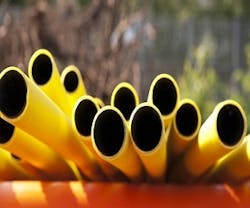Congress Writing Blank Checks for Water Infrastructure?
The PVC Pipe Association is urging Congress to curtail the practice of writing blank checks to local governments and utilities, focusing on outdated, closed procurement policies that exclude corrosion-proof piping materials for water and wastewater infrastructure.
Each year, more than 300,000 water main breaks occur throughout North America – or some 850 every day – mainly as a result of the continued use of corrosion-prone iron piping in the nation's water systems. Moreover, according to a congressional study, corrosion costs U.S. drinking water and wastewater systems over $50.7 billion annually or more than $1 trillion dollars over the next twenty years.
Taxpayers are getting soaked by the high costs of crumbling infrastructure and repeated water main breaks. They're also footing the costs of millions of gallons of lost water supply on their utility bills," says PVC Pipe Association Executive Director Bruce Hollands. "Unfortunately, the solution for many local officials is a band-aid approach of repairing or replacing our water mains with the same outdated and inferior iron pipes that currently make up much of our underground water systems. This material hasn't stood up to the test of time so it makes no sense to waste taxpayer dollars by installing more of it."
"Investing in infrastructure is critical for the nation," says Hollands. "With government budgets over-stretched and the country deeply in debt, we shouldn't be writing blank checks that can be wasted on outdated technologies like ductile iron piping that simply deteriorates too soon due to corrosion. It's now time that corrosion-proof piping technologies be considered in every bid. Free and open competition will drive innovation and ensure the best, most sustainable and cost-efficient materials are used, giving taxpayers the best bang for the buck," he said. "We have to return to traditional American values if we are to set the country on the right course again, and open competition is one of our most cherished and defining values."
